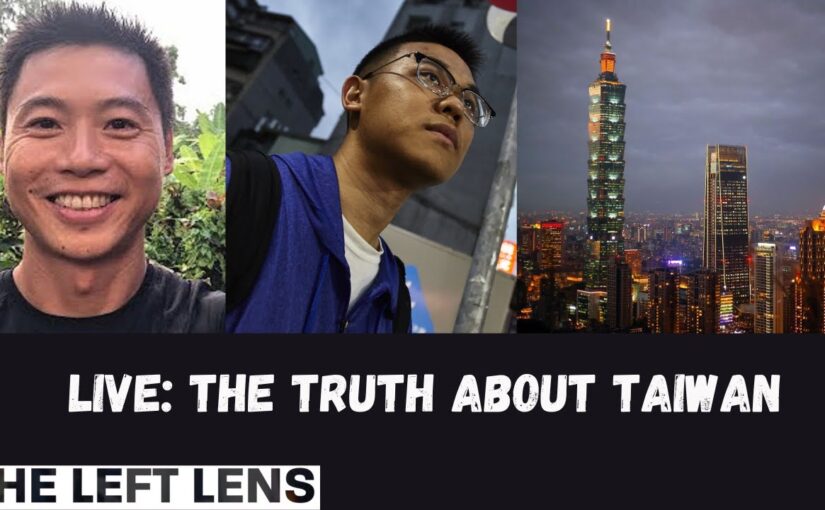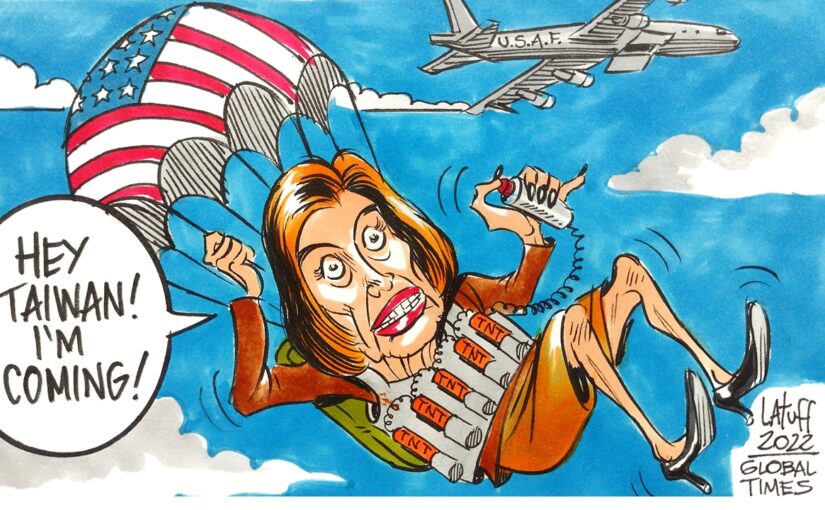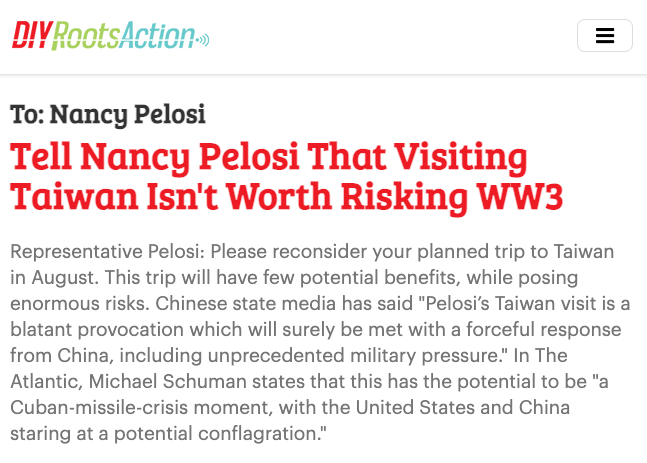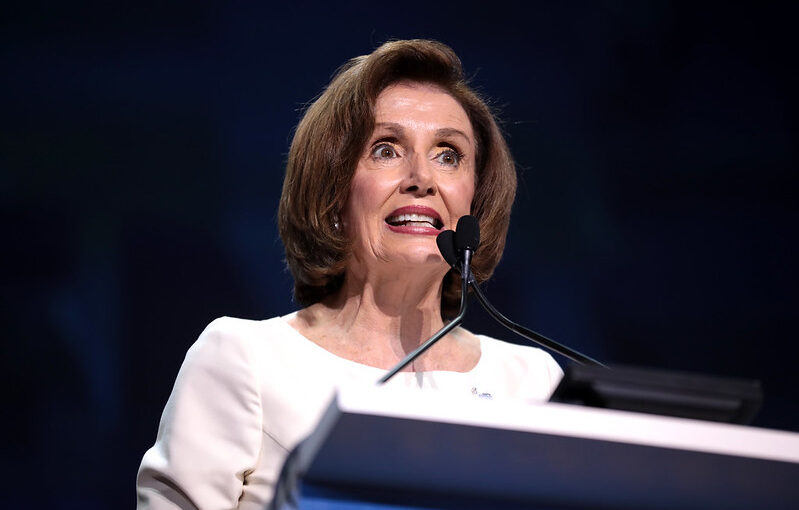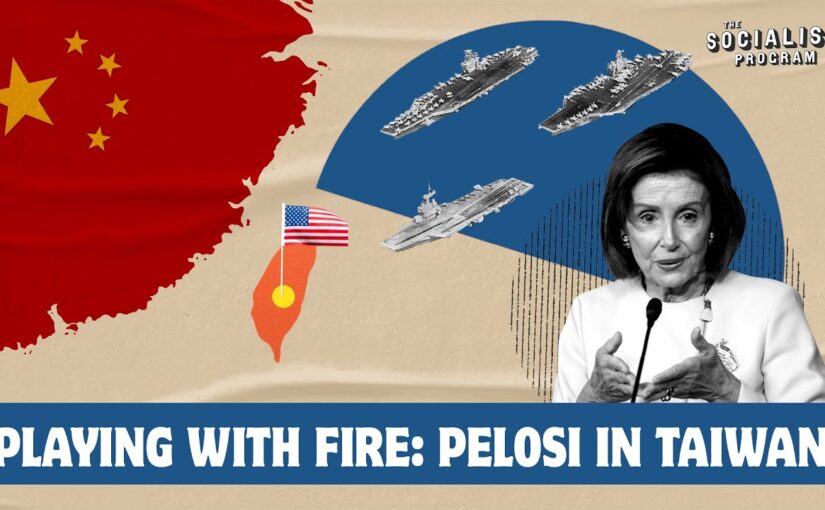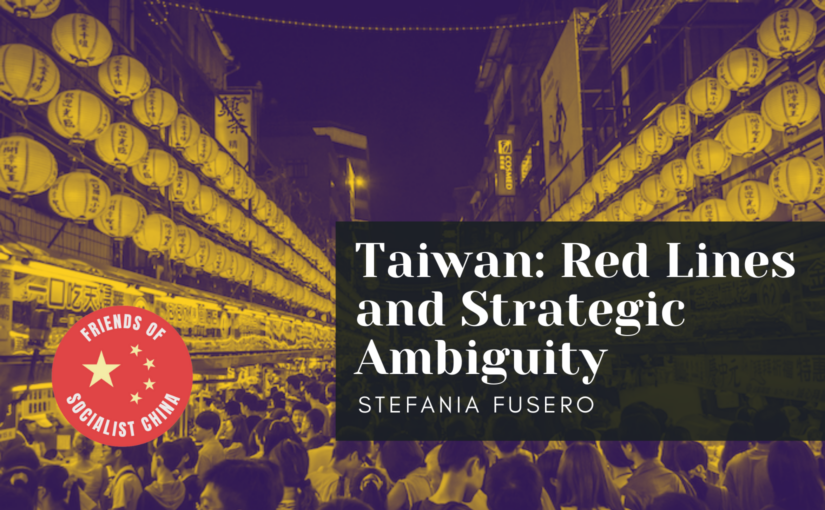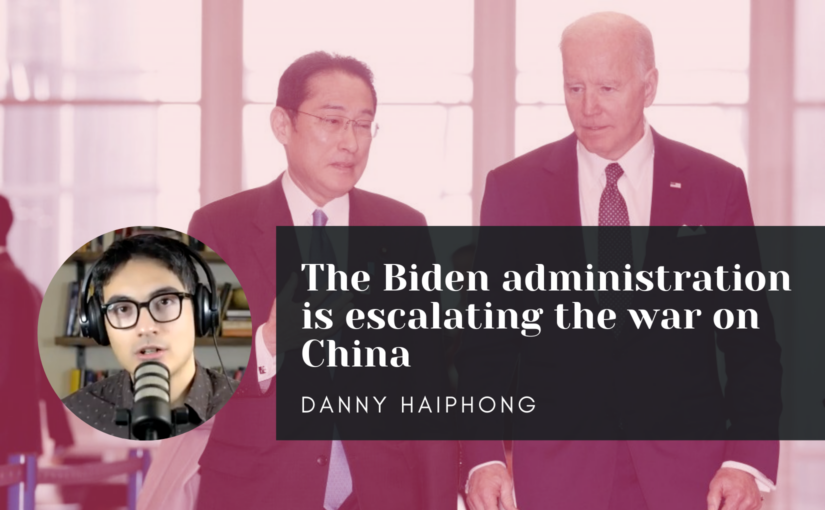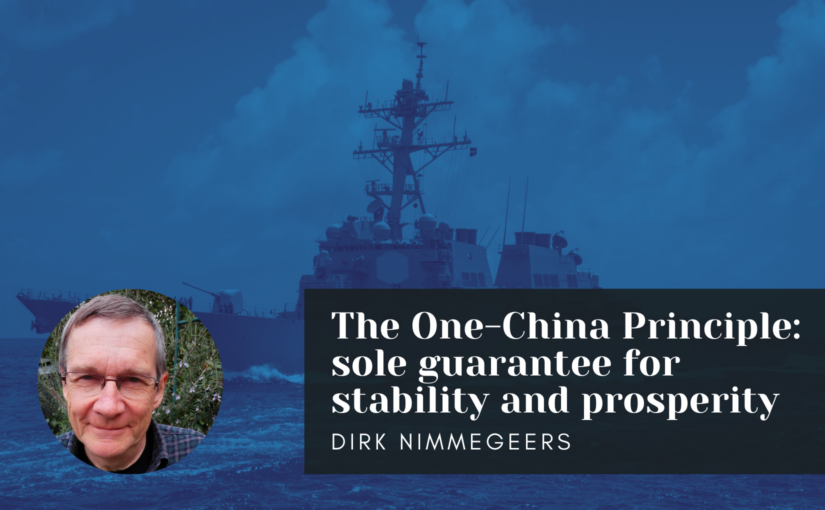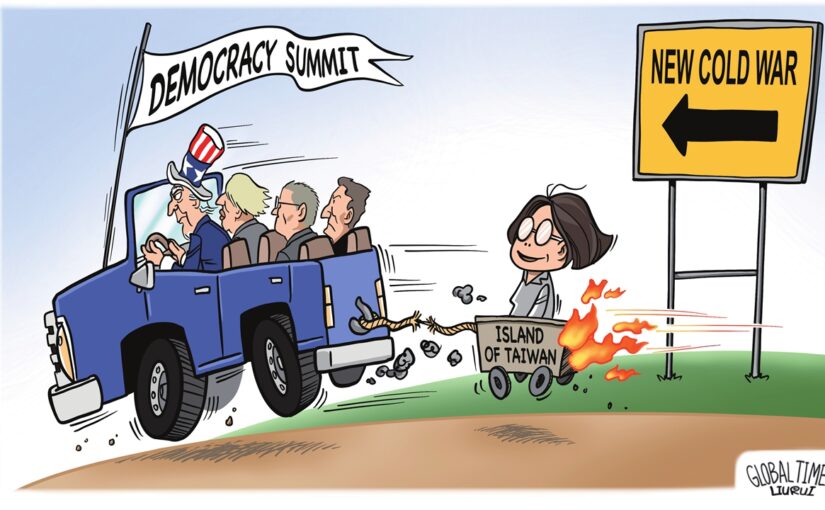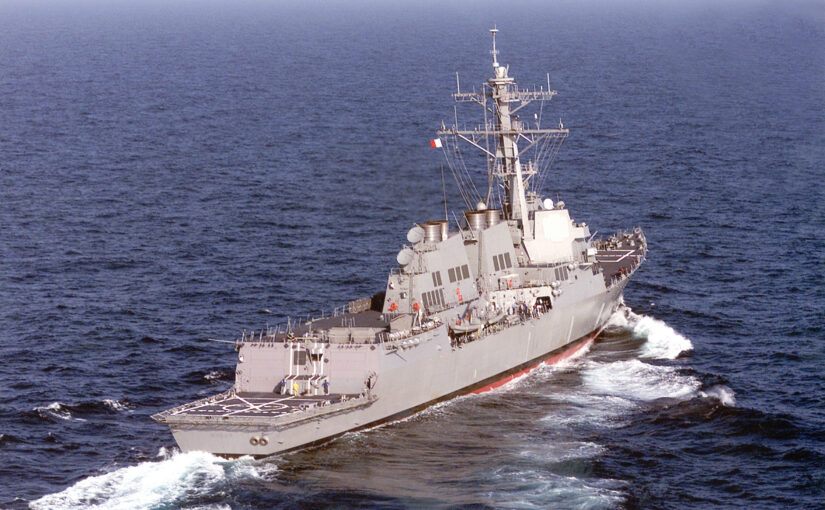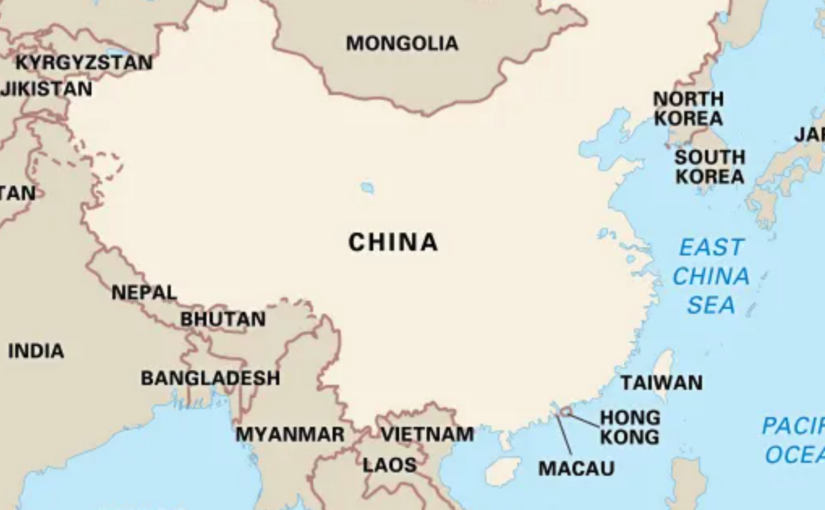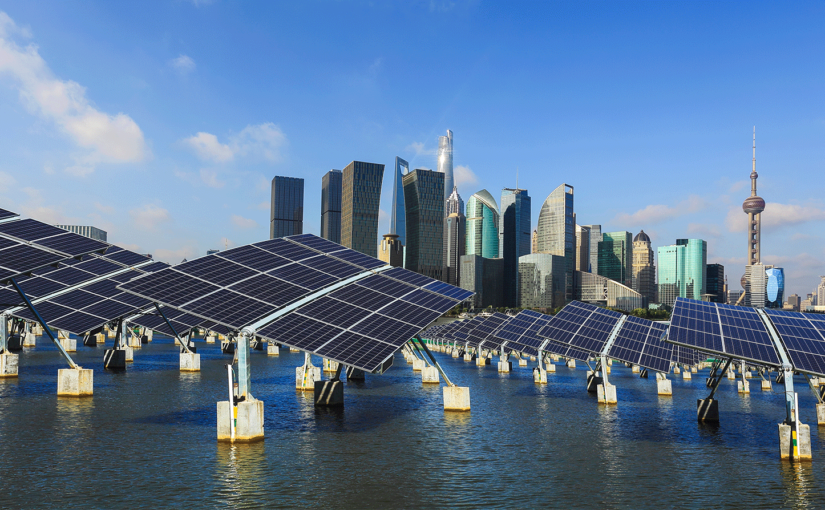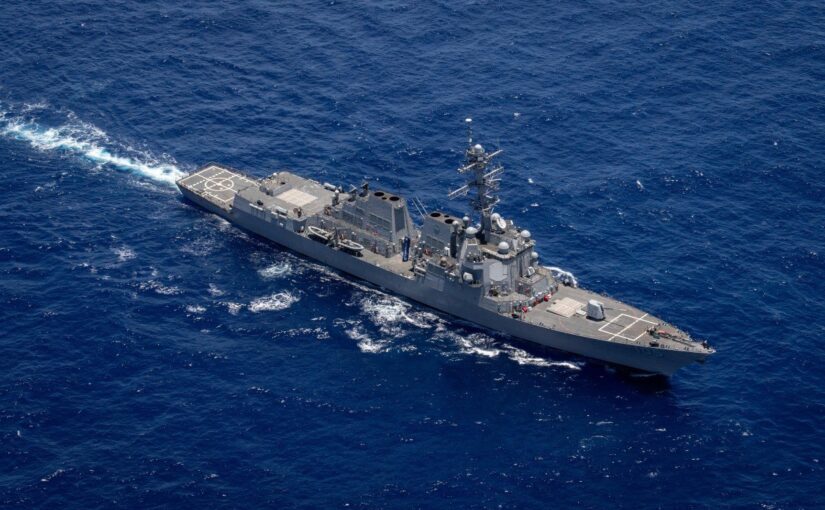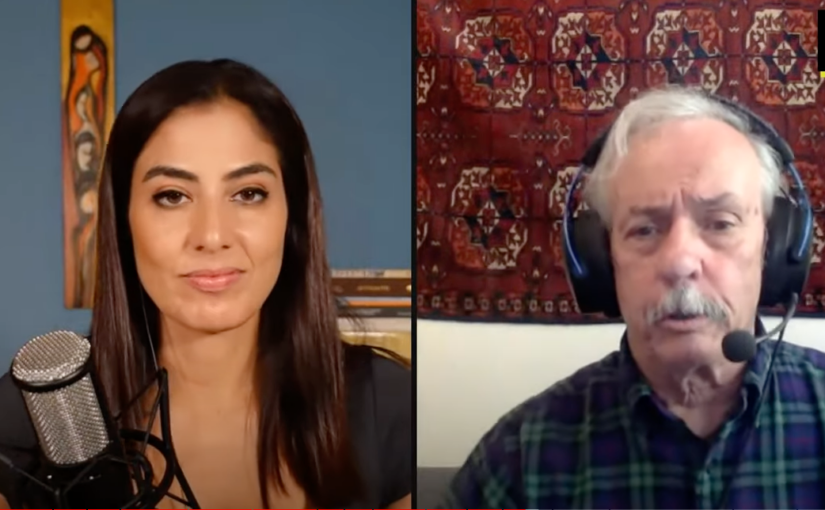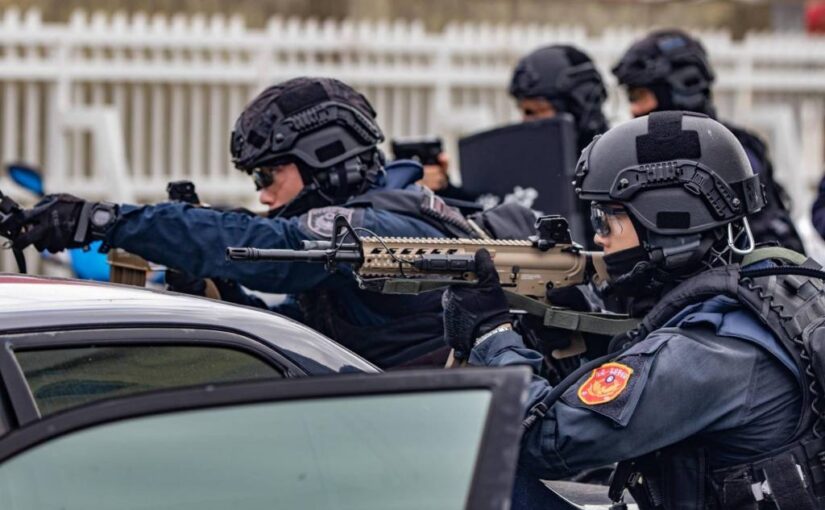Carl Zha and Xiangyu join Friends of Socialist China co-editor Danny Haiphong on his Left Lens program to provide critical context to Nancy Pelosi’s reckless trip to Taiwan. The history of Cross-Straits relations and the reasons behind the U.S.’s blatant disregard for China’s sovereignty are covered in this 2-hour long conversation.
Category: Taiwan
Statement by China’s Ministry of Foreign Affairs on Pelosi’s visit to Taiwan
The following statement was released by China’s Ministry of Foreign Affairs shortly after Nancy Pelosi landed in Taiwan. Pelosi’s visit is a gross violation of China’s sovereignty and the One China principle that the US has claimed to uphold since 1972. Furthermore it is an affront to the dignity of the Chinese people and a dangerous escalation in Washington’s New Cold War.
On 2 August, in disregard of China’s strong opposition and serious representations, Speaker of the U.S. House of Representatives Nancy Pelosi visited China’s Taiwan region. This is a serious violation of the one-China principle and the provisions of the three China-U.S. joint communiqués. It has a severe impact on the political foundation of China-U.S. relations, and seriously infringes upon China’s sovereignty and territorial integrity. It gravely undermines peace and stability across the Taiwan Strait, and sends a seriously wrong signal to the separatist forces for “Taiwan independence”. China firmly opposes and sternly condemns this, and has made serious démarche and strong protest to the United States.
There is but one China in the world, Taiwan is an inalienable part of China’s territory, and the Government of the People’s Republic of China is the sole legal government representing the whole of China. This has been clearly recognized by United Nations General Assembly Resolution 2758 of 1971. Since the founding of the People’s Republic of China in 1949, 181 countries have established diplomatic relations with China on the basis of the one-China principle. The one-China principle is a universal consensus of the international community and a basic norm in international relations.
In 1979, the United States made a clear commitment in the China-U.S. Joint Communiqué on the Establishment of Diplomatic Relations — “The United States of America recognizes the Government of the People’s Republic of China as the sole legal Government of China. Within this context, the people of the United States will maintain cultural, commercial, and other unofficial relations with the people of Taiwan.” Congress, as a part of the U.S. Government, is inherently obliged to strictly observe the one-China policy of the U.S. Government and refrain from having any official exchanges with China’s Taiwan region. China is all along opposed to the visit to Taiwan by U.S. congressional members, and the U.S. executive branch has the responsibility to stop such visit. Since Speaker Pelosi is the incumbent leader of the U.S. Congress, her visit to and activities in Taiwan, in whatever form and for whatever reason, is a major political provocation to upgrade U.S. official exchanges with Taiwan. China absolutely does not accept this, and the Chinese people absolutely reject this.
The Taiwan question is the most important and most sensitive issue at the very heart of China-U.S. relations. The Taiwan Strait is facing a new round of tensions and severe challenges, and the fundamental cause is the repeated moves by the Taiwan authorities and the United States to change the status quo. The Taiwan authorities have kept seeking U.S. support for their independence agenda. They refuse to recognize the 1992 Consensus, go all out to push forward “de-sinicization”, and promote “incremental independence”. The United States, for its part, has been attempting to use Taiwan to contain China. It constantly distorts, obscures and hollows out the one-China principle, steps up its official exchanges with Taiwan, and emboldens “Taiwan independence” separatist activities. These moves, like playing with fire, are extremely dangerous. Those who play with fire will perish by it.
The position of the Chinese Government and people on the Taiwan question has been consistent. It is the firm commitment of the more than 1.4 billion Chinese people to resolutely safeguard state sovereignty and territorial integrity. It is the common aspiration and sacred responsibility of all Chinese sons and daughters to realize the complete reunification of the motherland. The will of the people is not to be defied, and the trend of the times cannot be reversed. No country, no forces and no individual should ever misestimate the firm resolve, strong will and great capability of the Chinese Government and people to defend state sovereignty and territorial integrity and to achieve national reunification and rejuvenation. China will definitely take all necessary measures to resolutely safeguard its sovereignty and territorial integrity in response to the U.S. Speaker’s visit. All the consequences arising therefrom must be borne by the U.S. side and the “Taiwan independence” separatist forces.
China and the United States are two major countries. The right way for them to deal with each other lies only in mutual respect, peaceful coexistence, no-confrontation and win-win cooperation. The Taiwan question is purely an internal affair of China, and no other country is entitled to act as a judge on the Taiwan question. China strongly urges the United States to stop playing the “Taiwan card” and using Taiwan to contain China. It should stop meddling on Taiwan and interfering in China’s internal affairs. It should stop supporting and conniving at “Taiwan independence” separatist forces in any form. It should stop its acts of saying one thing but doing the opposite on the Taiwan question. It should stop distorting, obscuring and hollowing out the one-China principle. It must take credible actions to observe strictly the one-China principle and the provisions of the three China-U.S. joint communiqués, deliver on the “five noes” commitment made by the U.S. leadership (i.e. not seek a “new Cold War”; not seek to change China’s system; the revitalization of its alliances is not against China; not support “Taiwan independence”; not look for conflict with China), and not go further down the wrong and dangerous path.
Petition: Tell Nancy Pelosi that visiting Taiwan isn’t worth risking WW3
We encourage our readers to sign this petition calling on Nancy Pelosi to cancel her planned trip to Taiwan. As Australian former Prime Minister Paul Keating has noted, such a trip “would be unprecedented – foolish, dangerous and unnecessary to any cause other than her own.”
Petition text
Representative Pelosi: Please reconsider your planned trip to Taiwan in August. This trip will have few potential benefits, while posing enormous risks. Chinese state media has said “Pelosi’s Taiwan visit is a blatant provocation which will surely be met with a forceful response from China, including unprecedented military pressure.” In The Atlantic, Michael Schuman states that this has the potential to be “a Cuban-missile-crisis moment, with the United States and China staring at a potential conflagration.”
With war hawks like John Bolton and Mike Pompeo and an increasing number of politicians all jumping onboard to make themselves look “tough”, the longer you wait before cancelling this trip, the worse the political pressure to go will get. And the longer the controversy over it goes on, the harder it will be for China to back down from a military response. In short, this trip risks a military confrontation of the worst possible kind–and for what benefit?
We urge you to be the adult in the room and cancel this trip! Thanks.
Paul Keating: A reckless and provocative visit by Pelosi to Taiwan
With US Speaker Nancy Pelosi’s reported plan to visit Taiwan in August rapidly spiraling into potentially the most serious crisis in China/US relations in decades, former Australian Prime Minister Paul Keating has aptly commented: “It is hard to imagine a more reckless and provocative act.”
His short and succinct statement, which we reproduce below from the Australian website Pearls and Irritations, also notes that: “A visit by Pelosi would be unprecedented – foolish, dangerous and unnecessary to any cause other than her own.”
Paul Keating served as Prime Minister of Australia from 1991-96. Although not considered to be in any sense on the left of the Australian Labor Party (itself by all accounts a somewhat endangered species these days), as an Australian conscious of his Irish heritage, he was in favour of his country severing ties with the British monarchy and becoming a republic. He was equally conscious that Australia was part of the vast and dynamic Asia Pacific region, not an offshore island of Western Europe, and he strongly pushed for the development of relations with such regional powers as China and Indonesia. Certainly he puts the current Australian Labor Prime Minister Anthony Albanese to shame.
Keating has the admirable quality of not mincing his words. In January he described remarks by British Foreign Secretary Liz Truss, that China might engage in military aggression in the Pacific as, “nothing short of demented. Not simply irrational, demented.” He continued: “The reality is Britain does not add up to a row of beans when it comes to East Asia… Britain suffers delusions of grandeur and relevance deprivation… Truss would do us all a favour by hightailing it back to her collapsing, disreputable government, leaving Australia to find its own way in Asia.”
With, on present polling, Ms Truss likely to be installed as the next British Prime Minister before the end of summer, republication of Keating’s January 23 statement in Pearls and Irritations is timely.
When the United States has a divided foreign policy on an issue of such grave importance, the world begins a slide onto very thin ice.
US House Speaker, Nancy Pelosi – the third-ranked figure in the American hierarchy – is reported to be planning a visit to Taiwan, despite the urging of Administration officials from her own party. It is hard to imagine a more reckless and provocative act.
Across the political spectrum, no observer of the cross-straits relationship between China and Taiwan doubts that such a visit by the Speaker of the American Congress may degenerate into military hostilities.
If the situation is misjudged or mishandled, the outcome for the security, prosperity and order of the region and the world (and above all for Taiwan) would be catastrophic.
A visit by Pelosi would be unprecedented – foolish, dangerous and unnecessary to any cause other than her own.
Over decades, countries like the United States and Australia have taken the only realistic option available on cross-straits relations. We encourage both sides to manage the situation in a way that ensures that the outcome for a peaceful resolution is always available.
But that requires a contribution from us – calm, clear and sensitive to the messages being sent. A visit by Pelosi would threaten to trash everything that has gone before.
When the United States has a divided foreign policy on an issue of such grave importance, the world begins a slide onto very thin ice.
Herald indulges UK Foreign Secretary’s demented remarks on China
Australia’s foreign and defence ministers are giving respectability to Britain’s lunge for old-time glory.
Remarks by the British Foreign Secretary Liz Truss that China could engage in military aggression in the Pacific, encouraged by Russia’s contingent moves against Ukraine, are nothing short of demented.
Not simply irrational, demented.
And this piece of nonsense by Truss commanded the front pages of The Sydney Morning Herald in a piece written by the press gallery’s most celebrated beat-up merchant, Peter Hartcher.
Truss said such a move by China ‘could not be ruled out’.
And on those fleeting words, Hartcher pounced, carrying the notion to the readership of the Herald — and the Melbourne Age — that China and Russia are working in concert, justifying the headline, that ‘China could follow Russia into war’.
The irresponsibility of the story and Hartcher’s writing of it is breathtaking.
But it is a measure of how far the Herald has sunk in accommodating Hartcher’s extreme and unworldly positions — especially as they relate to China.
The underlying story is the government’s desperate promotion of Britain as a strategic partner of Australia in a policy of containment of China.
The reality is Britain does not add up to a row of beans when it comes to East Asia. Britain took its main battle fleet out of East Asia in 1904 and finally packed it in with its ‘East of Suez’ policy in the 1970s. And it has never been back.
Britain suffers delusions of grandeur and relevance deprivation. But there they were at Admiralty House kidding the rest of us that their ‘co-operation’ added up to some viable policy.
Australia’s great Foreign ‘non minister’, Marise Payne, supported by the increasingly strident Defence Minister Peter Dutton, standing beside the British Foreign Secretary looking wistfully for Britain’s lost worlds of the 19th and 20th centuries. Really.
Truss would do us all a favour by hightailing it back to her collapsing, disreputable government, leaving Australia to find its own way in Asia.
Xi Jinping told the audience at Davos this week that ‘major economies should see the world as one community’.
Hardly the sort of sentiment that sits contemporaneously with someone about to spring an aggressive military action. A point perhaps way too subtle for the Herald.
Dangerous Game: Pelosi provokes China over Taiwan
In this episode of The Socialist Program, presented on Breakthrough News, Brian Becker conducts a fascinating interview with Dr. Ken Hammond, Professor of East Asian and Global Studies at New Mexico State University and Friends of Socialist China Advisory Group member.
Taking the reported plan of Nancy Pelosi, Speaker of the US House of Representatives, constitutionally the third position after the President and Vice-President, to visit China’s island province of Taiwan next month as part of a regional tour, Ken and Brian discuss in detail how such a visit would represent a fundamental departure from the basic ‘guard rails’ of China-US relations, starting with the first Shanghai Communique, signed by the two countries during President Nixon’s ‘icebreaking’ visit in February 1972.
They situate this as part of a continuing, and intensifying, record of US provocations against China that Professor Hammond rightly describes as “reckless, irresponsible and very dangerous.”
Both interlocutors explain the centrality of reunification with Taiwan for not only the Chinese government, but also for the Chinese people as a whole, by reference to details of Taiwan’s history, as well as to the specific nature and context of the Chinese revolution – one to overcome the ‘century of humiliation’ and to, in Chairman Mao’s famous words, enable the Chinese people to “stand up.”
They also situate the present dangerous trajectory in Sino-American relations against the background of China’s rise. As Brian Becker points out, Chinese per capita income, although it has risen substantially, is still just 17.9% of the US. Yet China’s life expectancy has already surpassed that of the US. American working people therefore have something to learn from the Chinese example.
Regrettably, faced with the rise of China and the decline of the US, bipartisan American bourgeois policy is sliding towards war with barely a pretense of debate. The US elite, Ken Hammond explains, has not really come to terms with the reality of contemporary China and the fact that they simply cannot out-compete them. Brian and Ken conclude by stressing the importance of the fight for peace and for a progressive alternative for the United States and the American people.
It’s an illuminating discussion and we’re pleased to make it available here.
Taiwan: Red lines and strategic ambiguity
We are pleased to reproduce this article by Stefania Fusero, a Friends of Socialist China advisory group member from Italy, about recent developments in US rhetoric regarding Taiwan and the Biden administration’s undermining of the One China policy. The article was first published in New Cold War.
On May 5, 2022, the State Department amended its Taiwan factsheet removing the part in which it acknowledged that Taiwan is a part of China and stated that the US does not support Taiwan’s independence.
While Washington has said the update does not reflect a change in its policy, it has clearly increased both its military and political activism in the region and Biden even went so far as to say in Tokyo on May 23 that the US is ready to use military force to defend Taiwan in the event of an intervention from Beijing.
As the US-led proxy war of NATO against Russia in Ukraine continues, are we going to open a new front against another nuclear power, this time in Southeast Asia? Already our press has begun to compare the situation in Ukraine with the Taiwan issue, so we can expect that the great media circus will soon light up its spotlights to the seas of China – the narrative being likely the same as the one we have been made addicted to by now.
Will we therefore learn to recognise a glorious new flag to insert in the host of democratic countries, that of Taiwan? This will be the easy part, the harder one will be to understand what Taiwan is and why it will have become a vital issue for Western democracies. Will we once again be inundated with a thumping propaganda campaign focused on the epic struggle of democracy against autocracy, freedom against tyranny, light against darkness, good against evil?
Brief historical notes
First of all, it must be noted that Taiwan is not an independent state, in fact it is not even a state according to international law.
After the defeat of Japan in the Second World War, Taiwan returned to be an integral part of China, and as a consequence, after the defeat of Chiang Kai-shek’s Kuomintang, of the People’s Republic of China.
The name of Taiwan denotes an island (+ some other islets) about 160 km from the south-eastern coast of China, surrounded by the East China Sea to the north, the Philippine Sea to the east, the Luzon Strait to the south and the South China Sea to the southwest. The inhabitants are about 23 million, the capital is Taipei.
Starting from the end of the 13th century groups of Chinese began to arrive from the mainland and settle on the island, but during the 17th century Taiwan, to which Portuguese explorers had given the name of Formosa, became a pole of attraction also for Europe: the Dutch colonised the south and the Spanish colonised the north.
In 1644 the Ming were defeated by the Manchus, who founded the new Qing dynasty, which would be the last in Chinese imperial history. The prince of Yanping, known in the West as Koxinga, did not recognise the authority of the new Qing dynasty, and attempted to restore the Ming. In 1661 he crossed the strait, attacked the Dutch settlers claiming the island of Taiwan as a historic property of China, and ended Dutch colonisation, which had lasted nearly 40 years. Taiwan thus became a military base from which Koxinga and later his descendants tried in vain to restore the Ming dynasty. After finally defeating them in 1683, the Qing integrated Taiwan into their empire.
England defeated the Qing in the First Opium War in 1842, ushering in the so-called “century of humiliation” for China, which became the prey of the greed of several empires. To Japan, the last newcomer to the imperial club, the dying Qing dynasty was forced with the 1895 treaty of Shimonoseki to cede the island of Taiwan, which remained a Japanese colony until October 25, 1945, when the government of China, which had been became a republic, finally regained possession of Taiwan and the Penghu archipelago, reassuming their full legitimate sovereignty.
The victory over the Japanese, however, did not mean the end of military hostilities in China, where since 1927 the civil war between the Communist Party led by Mao Zedong and Chiang Kai-shek’s Kuomintang (KMT) had been intermittently raging.
The civil war ended in 1949 with the victory of the Communists and the defeat of Chiang Kai-shek, who, just as Koxinga had done a few centuries earlier, fled the mainland and occupied Taiwan, where his regime took on the name of ROC (Republic of China), the same name adopted by the state entity born after the fall of the Qing Empire in 1912.
This is the origin of the so-called ‘Taiwan question’.
One China or two Chinas?
For its part, on the very day of its foundation, October 1, 1949, the government of the People’s Republic of China (PRC) announced to the world that it “… is the sole legitimate government representing the entire people of the People’s Republic of China”. It declared to the United Nations that the KMT authorities had “lost all basis, both de jure and de facto, to represent the Chinese people” and therefore had no right to represent China. Since the founding of the PRC, a sine qua non condition for any country wishing to have relations with the PRC has been to recognise the government of the PRC as the sole legitimate authority of the whole of China, as well as to sever or refrain from establishing diplomatic relations with the Taiwanese authorities.
At least on this point did Mao Zedong and Chiang Kai-shek agree: China is one and has only one legitimate government, which obviously for the PRC is that of Beijing and for the KMT that of Taipei.
The US, which during the civil war had gambled on the Kuomintang, supporting it militarily and economically against the Communist Party, did not resign to its victory and continued to give generous aid to the KMT.
After the start of the Korean War in June 1950, the US government not only sent troops to Taiwan, which General Mac Arthur compared to an “unsinkable aircraft carrier”, but even considered using nuclear weapons against the PRC.
From a diplomatic point of view, meanwhile, the US questioned the status of Taiwan and lobbied for “dual recognition” among the international community in order to create “two Chinas”, whereas the government of the PRC, to safeguard the sovereignty and territorial integrity of the nation, staunchly supported the one China principle: there is only one China in the world, Taiwan is an integral part of it, and the PRC government is the sole legitimate government representing the whole of China.
This principle came gradually to be accepted by the international community, until on October 25, 1971, the United Nations General Assembly adopted Resolution 2758, which expelled the representatives of the Taiwanese regime and awarded the seat in the United Nations to the government of the PRC.
In the following year, February 1972, President Nixon’s historic visit to China led to the total revision of the official position of the US towards Taiwan. With the famous Shanghai communiqué, which was to be followed by another two in 1979 and 1982, later defined as “the three joint communiqués”, the USA relinquished the doctrine of the two Chinas, recognised the indivisibility of China, declared that Taiwan is a province of China and that the liberation of Taiwan is an internal affair of China; they also pledged to withdraw all US military forces stationed in Taiwan.
Was that the happy ending for the Taiwan issue, then? Unfortunately not, as shown by the tensions which today, while a war is still being waged in Ukraine, are intensifying around the Seas of China.
The one-China principle vs the so-called US strategic ambiguity
If from the very moment of its foundation in 1949 the position of the PRC on Taiwan has remained unequivocal and constant overtime, that of the US has instead been configuring in terms of “strategic ambiguity”.
As early as in 1979 Deng Xiaoping’s government articulated the policy of “peaceful reunification and one country, two systems”: China is committed to achieving peaceful reunification but will not rule out the use of force if any of its red lines were to be overpassed, if for example Taiwan ceased to recognise the principle that China is one and inalienable and/or proclaimed independence from the PRC or were occupied by any foreign countries.
The PRC wants to achieve reunification through peaceful negotiations and is willing to negotiate any matter except the overriding one-China principle. After reunification, the “one country, two systems” policy will be practiced: mainland China will continue with its socialist system and Taiwan will maintain its capitalist system for a long time to come. After reunification, Taiwan will enjoy a high degree of autonomy and the central government will not send troops or administrative personnel to be stationed in Taiwan.
Economic and cultural exchanges and people-to-people contacts between the two sides of the Taiwan Strait have made rapid progress since the end of 1987, and economic data shows that imports from the PRC and exports to the PRC far outweigh those with all other countries. Despite these trends, the current majority party in Taipei, the DPP (Democratic Progressive Party) led by Tsai Ing-wen, has increased military spending, moved closer to the US, and sharpened the hostility of its government towards the PRC.
Notwithstanding the principles solemnly stated in the three Communiqués between 1972 and 1982, the US has in fact often contradicted the spirit and the letter of them, adopting a policy toward Taiwan that they equivocally define as “strategic ambiguity”, which certainly does not favour a climate of trust and détente between the USA and the PRC.
We could give many examples to illustrate the ambiguous US policy on Taipei, such as the steady increase in arms sales to the island, the incendiary declarations of members of Congress on official visits to what the US does not even officially recognise as a nation, as well as the fact revealed in the WSJ last October 2021 that US military advisers had been present in Taiwan for at least one year, all obviously in flagrant violation of the agreements made in the three communiqués.
And what about a 2002 act that: “… Taiwan shall be treated as though it were designated a major non-NATO ally (as defined in section 644(q) of the Foreign Assistance Act of 1961?”
We can get an idea of how their policy of “strategic ambiguity” can be correctly interpreted by turning directly to official US sources. I highly recommend reading the Taiwan fact sheet on the official website of the US State Department, or rather its different versions that have appeared between 2019 and a few days ago. To facilitate comparison for anyone wishing to go through them in detail, I have prepared a PDF with the three versions in chronological order, highlighting the most significant parts (see here).
June 8, 2019: the fact sheet begins with the 1979 communiqué recognising the PRC as the sole legitimate government of one China. It also importantly states that the US does not support Taiwan’s independence.
May 8, 2022: what a twist! The sheet has dramatically changed: it begins by saying that Taiwan is a key partner of the United States in the Indo-Pacific and that the United States and Taiwan share the same values. US policy is guided by the Taiwan Relations Act, the three joint US-China Communiqués and the Six Assurances (in that order).
The PRC government is well aware that a few fundamental words have gone missing from the fact sheet, i.e. “the US does not support Taiwan’s independence”. On the other hand, the so-called Six Assurances are in!
To understand the reason why the Chinese government promptly and firmly reacted to these changes, we need to say just a few words about the Taiwan Relations Act and the Six Assurances.
The Taiwan Relations Act is a pro-Taiwan lobby-inspired law passed by Congress in 1979 to offset the effects of the US government’s recognition of the PRC: “…the United States shall provide Taiwan with arms of a defensive character and shall maintain the capacity of the United States to resist any resort to force or other forms of coercion that would jeopardize the security, or social or economic system, of the people of Taiwan.”
The term ‘Six Assurances’, instead, refers to six Reagan-era security assurances unilaterally provided to Taiwan in 1982 but not formally made public, which the United States declassified in 2020, among which: the United States has not agreed to set a date for ending arms sales to Taiwan; the United States has not agreed to consult with the PRC on arms sales to Taiwan; the United States has not agreed to revise the Taiwan Relations Act.
May 28, 2022: the fact sheet, surreptitiously modified one more time, reaffirms that the US does not support Taiwan’s independence.
Playing with the Joint Communiqués as well as with laws and provisions that unilaterally regulate, in a more or less open way, relations between China and the USA, erratically emphasising either, is sufficient in itself to convey totally contradictory and obviously destabilising messages to the world.
What is China doing in the meantime? Its policy has constantly remained the same, that to foster a gradual and peaceful reunification but in the meantime, it is bracing for the worst. In fact, for the PRC Taiwan is not a pawn to be used to destabilise countries thousands of km away from its national territory, but “… it is part of the sacred territory of the People’s Republic of China. It is the sacred duty of all the Chinese people, including our fellow Chinese in Taiwan, to achieve the great reunification of the motherland.” (from the Preamble of the Constitution of the PRC)
Sources:
https://en.wikisource.org/wiki/Shanghai_Communiqu%C3%A9
https://en.wikisource.org/wiki/Joint_Communiqu%C3%A9_on_the_Establishment_of_Diplomatic_Relations
https://en.wikisource.org/wiki/US%E2%80%93PRC_Joint_Communique,_August_17,_1982
https://web.archive.org/web/20190608140339/https://www.state.gov/u-s-relations-with-taiwan/
https://www.state.gov/u-s-relations-with-taiwan/
https://oec.world/en/profile/country/twn#Profile
https://www.mfa.gov.cn/ce/celt/eng/zt/zgtw/t125229.htm
https://uscode.house.gov/view.xhtml?req=(title:22%20section:2321k%20edition:prelim)
http://www.npc.gov.cn/englishnpc/constitution2019/201911/1f65146fb6104dd3a2793875d19b5b29.shtml
Danny Haiphong: The Biden administration is escalating the war on China
Friends of Socialist China co-editor Danny Haiphong joined peace activist Margaret Flowers for an episode of Clearing the Fog to discuss the Biden administration’s escalating New Cold War against China. A particular focus was US president Joe Biden’s recent statement expressing a commitment to military intervention in Taiwan during his first trip as president to Asia, and the underlying motivations of the New Cold War being rooted in the US’s fear of China as a good example of stability, sovereignty, and a commitment to socialism that runs counter to the aims of US imperialism.
The “America COMPETES Act of 2022” risks turning Taiwan into the next front line
Keith Lamb explains how one of the many dangers in the America COMPETES Act, which now just awaits presidential ratification, is that it effectively writes into US law a repudiation of the ‘one China’ policy, thereby potentially opening the door to a catastrophic confrontation.
The America Creating Opportunities to Meaningfully Promote Excellence in Technology, Education and Science (COMPETES) Act of 2022 only needs to be passed by the President and it will become law. The bill sounds innocuous but the contents of it are not. While the bill is partly about promoting US science and technology it is just as much about preventing the rise of China’s 1.5 billion as well as the Global South who have democratically partnered with China to build a new world through the Belt and Road Initiative.
In attempting to prevent China’s rise the bill pays special attention to preventing cross straits reunification with the country’s Taiwan province, which could lead to chaos on both ends of Eurasia while the US gains. Already, in the west, the Ukrainian front has been opened at the expense of Europeans who are now forced to buy US gas all the while, as reported in the Global Times, the US has increased its purchase of Russian crude oil by 43 percent. In the east a similar strategy is at play. Taiwanese and European tech companies have been forced to limit their sales to mainland China while the US has made special tech provisions to continue selling.
If the America COMPETES Act of 2022 is passed stoking tensions with China and playing the Taiwan card will become US law! If a war can also be sparked in the east then the US will, as in Ukraine, seek to profit geopolitically and economically by fuelling tensions through weapons sales and “sitting it out” while others are sacrificed in a proxy war.
Continue reading The “America COMPETES Act of 2022” risks turning Taiwan into the next front lineThe One-China Principle: sole guarantee for stability and prosperity
We are pleased to publish this original analysis by Dirk Nimmegeers, co-editor of ChinaSquare.be and China Vandaag (Belgium) and Friends of Socialist China advisory group member, on the issue of Taiwan.
Taiwanese and Western politicians and journalists are spotlighting alleged similarities between the war in Ukraine and Mainland China-Taiwan relations. Ignoring or concealing real differences and turning reality upside down undermines the one-China principle.
Chinese top diplomats such as Foreign Minister Wang Yi, director of the Office of the Foreign Affairs Commission of the CPC Central Committee Yang Jiechi, and Ministry of Foreign Affairs spokesperson Hua Chunying react sharply to this, and rightly so.
‘Taiwan is not Ukraine’
On February 23, a reporter from Hong Kong’s Phoenix TV asked Hua Chunying, Deputy Minister and Foreign Affairs spokesperson, what she thought of ‘the Taiwanese leaders’ comparing the Ukraine problem to the Taiwan question, and expressing the hope that the international community will continue to provide Taiwan with weapons so that China’s mainland dare not invade Taiwan by force’.
Hua Chunying replied: ‘Taiwan for sure is not Ukraine. Taiwan has always been an inalienable part of China’s territory. This is an indisputable historical and legal fact’. On March 7, a Bloomberg reporter asked Secretary Wang Yi, ‘What similarities are there between the current situation in Ukraine and the question of Taiwan? How likely would you say conflict in the Taiwan Strait is at the moment?’ Wang Yi’s reply began as follows: ‘Let me first make it clear that the Taiwan question and the Ukraine issue are different in nature and are not comparable at all. Most fundamentally, Taiwan is an inalienable part of China’s territory, and the Taiwan question is entirely China’s internal affair’.
The comparisons that you now see popping up in our media for a specific purpose revolve around the themes of independence, political-economic systems and violence.
Taiwan is not an independent state, Ukraine is.
Russia has reattached a part of independent Ukraine, Crimea (which had been transferred from Russia to Ukraine in 1954), and might plan to annex more regions. China wants to eventually, and peacefully reintegrate Taiwan, which is de facto autonomous, back into the motherland. The resemblance is only there for those who drag it in purposefully. Taiwan is not an independent country and China will never recognize it diplomatically. China has indeed recognized Ukraine and has good relations with that country, of which it is the main trading partner. Moreover, as Benjamin Ho observes: ‘Kyiv joined the Belt and Road Initiative in 2017, Chinese companies have been upgrading the country’s ports and subways. In 2020, Ukraine also signed a memorandum of understanding with China’s Huawei.’
Continue reading The One-China Principle: sole guarantee for stability and prosperityGlobal Times editorial on the inclusion of Taiwan province in Biden’s ‘Summit for Democracy’
This significant editorial from leading Chinese newspaper Global Times warns that the Biden administration is making a dangerous and provocative mistake in inviting the Taiwan authorities to its so-called Summit of Democracies next week. This dangerous escalation on the part of the US lends increased topicality and indeed urgency to our own Summit for Socialist Democracy, to be held on December 11, and which includes Chinese, Cuban, Vietnamese, Korean and Venezuelan perspectives among others.
The US Department of State released on Tuesday evening the list of 110 “participants” to the “Summit for Democracy.”
What caught the immediate attention of worldwide media were, first, the island of Taiwan was on the list; second, several countries were missing from the list, not just China and Russia, but also Turkey, a NATO member, Hungary, an EU and NATO member, and Singapore, Thailand and Vietnam from Asia, and all the countries from the Middle East except for Israel and Iraq.
Taiwan being invited was the most eye-catching. In addition to being thankful to the Biden administration, the Democratic Progressive Party (DPP) authority immediately announced its representatives to the summit including Audrey Tang Feng, a member of Taiwan’s “executive authority,” and Hsiao Bi-khim, the island of Taiwan’s representative to the US.
Continue reading Global Times editorial on the inclusion of Taiwan province in Biden’s ‘Summit for Democracy’Li Jingjing interviews Carlos Martinez on Xi-Biden Summit
Friends of Socialist China co-editor Carlos Martinez was interviewed by CGTN journalist Li Jingjing about the recent Xi-Biden summit, the prospects for the New Cold War in the coming period, the failure of the trade war, the influence of the military-industrial complex on US policy, escalating tensions over Taiwan, and the possibilities for cooperation between the major countries on the question of climate change.
Taiwan – flashpoint for war with China
We republish here an important article by Simon Korner providing background to the increasingly tense situation in the Taiwan Straits. It was originally published on the Facebook page of the Socialist Correspondent. Noting that Taiwan has currently become the most dangerous flashpoint for a possible new world war, the article exposes the dangerous and duplicitous actions of US imperialism and explains how the reunification of Taiwan with the mainland represents the unfinished business of the more than century long Chinese revolution.
This year has seen a significant rise in tensions over Taiwan. It is now the most dangerous flashpoint for world war of all the potential conflict zones.
It is the US which is deliberately escalating the aggression as it faces the rapid economic growth of China, whose GDP is set to lead the world by 2035.
The US has made it clear that it will never allow another power to share its pre-eminent global position. The American government’s 2017 National Security Strategy stated that China poses a threat to “American power, influence, and interests, attempting to erode American security and prosperity”. Mike Pompeo put it more bluntly when he said that nations have to “pick a side” (July 23, 2020), a view echoed by President Biden: “We are in a competition to win the 21st century, and the starting gun has gone off,” he said (Sydney Morning Herald, 9 June, 2021).
Continue reading Taiwan – flashpoint for war with ChinaBiden targets China: Turning Taiwan into a military outpost
We are pleased to republish this valuable article by Gary Wilson in Struggle for Socialism providing an overview of the history of US support for Taiwanese separatism. This support has received a boost recently with Biden and Blinken’s talk of bolstering Taiwan militarily and calling for it to be recognised within UN institutions. Such activity on the part of the US government is simply an attempt to reimpose on China the imperialist domination that was overthrown with the founding of the People’s Republic in 1949.
The Guardian reports that U.S. Secretary of State Antony Blinken threatened a U.S. military buildup in Taiwan in a “side meeting” at the G20 summit in Rome on Oct. 31.
The Guardian added that Blinken’s threat “came a week after Biden said the U.S. may support Taiwan’s independence militarily and Blinken called for Taiwan to be recognized within U.N. institutions.”
Continue reading Biden targets China: Turning Taiwan into a military outpostDee Knight: War threats add to climate change danger on eve of COP26
On the eve of the COP26 Conference in Glasgow, we are very pleased to publish this timely article contributed by Dee Knight, member of the Anti-War Subcommittee of the Democratic Socialists of America (DSA) International Committee, showing how the two vital struggles, against climate catastrophe and imperialist war, are inextricably linked and relating this to US imperialism’s many decades of implacable hostility to the Chinese revolution in particular as well as to socialism and national liberation in Asia generally.
In the buildup to the World Climate Change summit, slated for Halloween and the first week of November in Glasgow, a NY Times report said “China must pivot away from coal immediately” to avoid climate disaster. The article says “attention is riveted on China and whether it will do more to cut emissions.” It quoted a British member of Parliament saying “China is responsible for almost a quarter of all global emissions right now.”
The Times article acknowledges that China leads the world in hydroelectric, solar and wind power. While admitting the United States has released more human-generated carbon dioxide over the past century than any other country, the article says “China is the biggest current emitter now by a wide margin,”. But on a per capita basis, China’s emissions are less than half the U.S. total. And China is converting to renewables much faster than the U.S.
Continue reading Dee Knight: War threats add to climate change danger on eve of COP26Danny Haiphong: Taiwan shows the American empire is a paper tiger
In this powerfully-argued piece on Black Agenda Report, Danny Haiphong exposes the US’s longstanding efforts to use Taiwanese separatism as a means of destabilising the People’s Republic of China. Danny connects this history to the present New Cold War being waged by the US and its allies, directed against not only China but against the entire Global South and the very idea of a multipolar future.
Mao Zedong often referred to U.S. imperialism as a paper tiger. This is truer today than it was in the mid-20th century when Mao frequently employed the phrase. No matter how bellicose the American empire becomes, its strength is more appearance than fact. Brutal violence and exploitation are thus signs of weakness, not legitimacy or credibility. The U.S.’s recent military maneuvers around the issue of Taiwan clearly signal a growth in the decay of the American Empire.
Taiwan has been a topic of conversation in the U.S. corporate media throughout the month of October. Headlines have circulated that claim China has escalated military tensions by flying military aircraft over Taiwan’s so-called Air Defense Identification Zone (ADIZ). The ADIZ was created by the United States after World War II and isn’t recognized by international law. In fact, Taiwan’s so-called ADIZ includes large portions of mainland China. This hasn’t stopped the U.S. media from beating the drums of war with China.
The U.S. Department of Defense under Joe Biden has affirmed its commitment to threatening war with China over Taiwan. Pentagon Press Secretary John Kirby has warned China that its so-called “pressure campaign” on Taiwan requires the United States to step up efforts to “protect” the island from “danger.” Just days after Kirby’s speech, U.S. and Canadian warships sailed through the Taiwan Strait in a show of joint military force not seen since the U.S. normalized relations with China in 1979. This blatant intensification of military aggression came just a week after reports surfaced that the U.S. had spent the last year secretly deploying special forces to Taiwan.
The American empire has a long history of using Taiwan to meddle in China’s affairs. After pouring heavy financial and military support into the Kuomintang’s (KMT) brutal war against the Communist-led revolution of 1949, the U.S. supported the KMT’s exile to Taiwan. The U.S. heavily militarized Taiwan and even threatened to use nuclear weapons in an attempt to undermine the Chinese revolution. More than two decades would pass before the U.S. cease the prevention of the People’s Republic of China to gain full recognition at the United Nations in place of the “Republic of China” government located in Taiwan. In 1972, the U.S. signed the Shanghai Communiqué —a document that stipulates U.S. recognition of Taiwan as part of China and clearly articulates that the U.S. will cease all attempts to military intervene in its affairs.
That Taiwan is part of China is not controversial outside of the parasitic lens of U.S. and Western imperialism. Taiwan has experienced centuries of colonial incursions. This includes a half-century of Japanese colonialism that ended only after Chinese resistance forces sacrificed more than fifteen million people to win historic victories against fascism in World War II. The return of Taiwan to China is thus an important victory for the anti-colonial movement. And it is this victory that the United States is currently working hard to reverse.
Former U.S. President Donald Trump and current President Joe Biden have provided staunch support to the Democratic Progressive Party (DPP), the separatist political party ruling in Taiwan. In 2019, Trump signed the TAIPEI Act into law which encourages the U.S. to facilitate deeper ties between international organizations and Taiwan’s separatist-led government. This blatant violation of the One-China policy has been followed up with billions worth in military arms deals to Taiwan. After Trump approved $1.8 billion in arms sales to Taiwan to end his administration, Biden signed off on $750 million more in military weapons transfers to Taiwan which included 40 M109A6 Medium Self-Propelled Howitzer Systems. These maneuvers bolster the Western-oriented government in Taiwan led by President Tsai Ing-wen, a devout separatist who has openly called Taiwan “vibrantly democratic and Western.”
U.S. interference in China’s relations with Taiwan has made a profound impact on U.S. public opinion. More than half of Americans now support U.S. military intervention in Taiwan . Of course, the poll conducted by the Chicago Council on Global Affairs added “if China invades” to the question for added anti-China effect. That the poll would promote the propaganda that China could invade its own province should come as no surprise. The Chicago Council on Global Affairs is funded in large part by the Pritzker Foundation . The Pritzker family’s enormous wealth derives not only the from the Hyatt hotel but also from its deep connections to war profiteering and the CIA.
Taiwan is the clearest expression of the U.S.’s agenda to reassert neocolonialism in the Asia Pacific as a means to counter China’s rise. However, attempts to bully China over Taiwan have no legitimate end goal. China will not bow down to the claims that Taiwan is an “independent country” since no such thing is acknowledged by international law. The United States must think long and hard about escalating militarily with China. Despite an enormous shift of U.S. military resources to the Indo-Pacific Command, war strategists and profiteers alike would face heavy casualties in a direct conflict with China’s high-tech military armed with a nuclear deterrence.
Unlike the first Cold War, the American Empire is in precipitous decline. Economic immiseration is all the American Empire has to offer the vast majority of humanity. U.S. military policy only facilitates death, destruction, and displacement. U.S. domestic politics are mired in stagnation and lack the capacity to address any fundamental problem facing working class and oppressed people. The paper tiger of American Empire is being ripped apart by its own contradictions. Crisis is the only stable feature left remaining of the American Empire’s so-called dominance.
China does not possess such problems. China’s government has shown consistent respect for international law with regard to Taiwan. China’s stable, prospering socialist economy has eliminated extreme poverty and contained COVID-19. These achievements alone have gained China’s socialist model immense prestige both with the Chinese people and the people of the Global South. Still, the American Empire remains dangerous precisely because its desperation requires the escalation of a New Cold War that threatens to bring about a confrontation between two nuclear powers.
Taiwan is but one piece on a chessboard designed by the United States to undermine China and thus the world from charting a course of history free of imperialist domination. Anyone who calls themselves “the Left” would be foolish to follow the imperialist paper tiger into a trap of its own making with regard to Taiwan or any other feature of the U.S.’s New Cold War against China. Yet this is exactly what has happened. Most of the “left” has abdicated its responsibility to oppose U.S. imperialism and therefore shares responsibility with the right for the U.S.’s hostilities toward China. U.S. interference in China’s affairs regarding Taiwan should thus be seen as an opportunity to reverse this dangerous course and place the demand for the U.S. to respect international law at the forefront of the movement.
Rania Khalek interviews Ken Hammond about Taiwan
In this detailed and useful interview on BreakThrough News, Rania Khalek interviews history professor and China expert Ken Hammond about the rising tensions surrounding Taiwan. They cover the history of the island, the question of China’s representation at the United Nations, the One China policy, the differences between Trump and Biden, and the US’ longstanding attempts to destabilise and balkanise China.
Washington escalates: Secret special forces operating for past year in Taiwan
We are republishing this useful article by Gary Wilson in Struggle for Socialism analysing the significance of recent revelations that US special operations and support troops have been secretly operating in Taiwan for the last year, in violation of international law.
Unless the U.S. government promptly removes its military forces from China’s Taiwan province, China may send in its own military force to defend its territory, declared an Oct. 8 editorial in Global Times, the Communist Party of China’s daily newspaper.
Global Times explains: “We must resolutely define the deployment of U.S. troops in Taiwan as an ‘invasion.’ The mainland has the right to carry out military strikes against them at any time. We will not make any promises over their safety. Once a war breaks out in the Taiwan Straits, those U.S. military personnel will be the first to be eliminated. Through such a declaration, we must make Washington understand that it is playing a dangerous game that is destined to draw fire onto itself and it is risking the lives of young U.S. soldiers.”
Continue reading Washington escalates: Secret special forces operating for past year in Taiwan